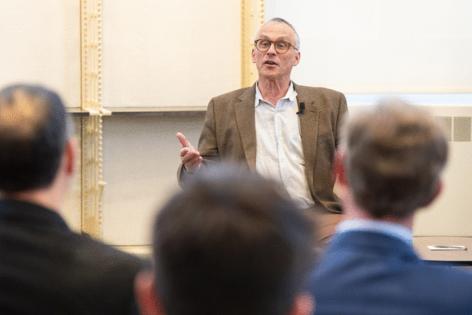Commentary: A university president stands up for higher education as it's under assault
Published in Op Eds
The Trump administration’s attack on higher education is both wide-ranging and carefully targeted at certain institutions. It has included, figuratively speaking, cluster bombs and surgical strikes.
The ordinary human impulse when under assault is to flee or to hide. The more noble response, however, is to stand up and confront one’s attacker head on, acting with firmness, calm and clarity.
Many in higher education have opted for the former strategy. Michael Roth, the president of Wesleyan University in Connecticut, has taken the harder and more honorable route. He has been a strong and clear voice defending higher education in op-eds, TV appearances, podcasts and interviews with publications such The New Yorker, The Washington Post and Politico.
Roth is the statesman that higher education needs in this difficult time, explaining its mission and record, responding to criticisms and threats, and pointing the way to a better future.
His statesmanship has been shrewd, strategic and inspiring. Most especially, it has been courageous.
Roth is a Wesleyan alum. He graduated in 1978 and has been its president since 2007. He earned a doctorate in history at Princeton; his central academic interest is how people make sense of the past.
Perhaps this analytical perspective helps him make sense of this turbulent present.
There are several impressive features of Roth’s academic statesmanship.
First, he comes to the debate as a passionate, but also fair-minded, advocate for higher education. He is a staunch supporter but not an uncritical one. Roth has long argued that some parts of the higher education system are elitist and condescending. He acknowledges that elite institutions are often most accessible to the children of the wealthy and privileged. While his political views are left of center, he argues that more conservative voices are needed on college campuses to provide ideological balance and a wider range of perspectives.
Second, Roth has persuasively framed the challenges facing higher education as part of the administration’s attack on civil society, including law firms, nonprofits, cultural institutions and the media. Civil society, he says, must resist the slide toward authoritarianism that has gathered momentum. Roth believes the current moment is dire. “I think this is the greatest fear in civil society, including in the higher education system, since the McCarthy era. People are really afraid to be targeted by the government,” he told Politico.
Roth says that a vibrant civil society is essential and represents traditional American values. Leaders in civil society, and especially in higher education, should accept their responsibility to participate in this debate.
Third, he has been willing to engage on hard and specific issues such as antisemitism. In a sharply worded essay in The New York Times in April, Roth argued that the administration is using this issue cynically.
“As the first Jewish president of a formerly Methodist university, I find no comfort in the Trump administration’s embrace of my people, on college campuses or elsewhere,” he wrote. “Jew hatred is real, but today’s anti-antisemitism isn’t a legitimate effort to fight it. It’s a cover for a wide range of agendas that have nothing to do with the welfare of Jewish people.”
Fourth, he has acknowledged that he is now fearful, yet is compelled to step forward. “I think my job as a leader of the university is to speak up for the values that we claim to believe in, especially when they’re at odds with people with enormous power,” he said in The New Yorker.
Roth says he has had to become more combative than he prefers, but that he is obliged to respond when vulnerable people are getting mistreated.
Finally, Roth continues to depict America’s higher education system as a national treasure that has benefited from a strong partnership with the federal government. The research accomplishments of our universities have been breathtaking and have improved the lives of hundreds of millions around the world. And a college education, he declares, is a truly transformative opportunity.
Roth was the recipient of this year’s PEN/Benenson Courage Award that honors exceptional acts of courage in the exercise of freedom of expression. He began his acceptance speech by quoting a friend who told him that “if someone offered me a courage award, I’d duck.”
Roth did not duck then and has not ducked, hedged or wavered since. He has stood tall and, in doing so, reminds us of the powerful words of the great reformer, Martin Luther, “Here I stand; I can do no other.”
Would that all higher education leaders stand with him.
_____
John T. Shaw is director of the Paul Simon Public Policy Institute.
_____
©2025 Chicago Tribune. Visit at chicagotribune.com. Distributed by Tribune Content Agency, LLC.

























































Comments